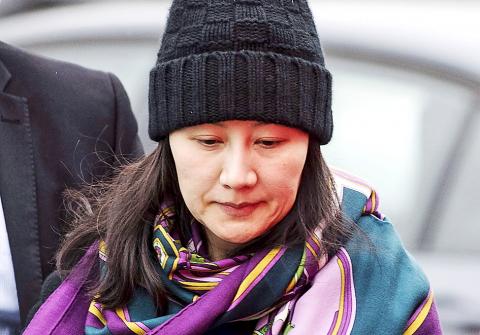A Chinese government spokesman yesterday took issue with US claims that telecoms giant Huawei Technologies Co (華為) poses a threat to other countries’ information security because of Chinese laws.
The comments by China’s National People’s Congress spokesman Zhang Yesui (張業遂), ahead of the annual session of China’s rubber-stamp parliament, followed news that Huawei chief financial officer Meng Wanzhou (孟晚舟), who was arrested by Canada at the request of the US, is suing the Canadian government over her treatment.
Lawyers for Meng, who is staying at a property she owns in Vancouver after her release on bail, on Sunday said that she was suing the Canadian government, its border agency and the national police force, alleging she was detained, searched and interrogated before she was told that she was under arrest.

Photo: AP
The US is seeking Meng’s extradition to face charges she misled banks about the company’s business with Iran.
Washington has been lobbying its allies to shun Huawei’s products on national security grounds, saying Chinese law requires the company to provide it with intelligence on its foreign clients whenever requested.
Zhang said that US officials were taking China’s national security law out of context and “playing up the so-called security risks” associated with Chinese companies.
The 2017 law borrows from other countries’ experiences and is designed explicitly to “protect human rights and the lawful rights of individuals and organizations,” Zhang said.
“This kind of behavior is interference into economic activities by political means and is against World Trade Organization rules. It disrupts an international market order that is built on fair competition,” Zhang told reporters.
“This is a typical case of double standards that is neither fair nor ethical,” he added.
Washington’s accusations have been underscored by Meng’s arrest on Dec. 1.
Huawei also faces other allegations in the US related to alleged theft of technology.
Meng is due in court tomorrow to set a date for the extradition proceedings to start. It could be several months or even years before her case is resolved.
Chinese Ministry of Foreign Affairs spokesman Lu Kang (陸慷) yesterday also accused Canada and the US of abusing their bilateral extradition treaty.
He reiterated China’s demand that the US withdraw its accusations against Meng.
China urges Canada to “immediately release Ms Meng Wanzhou and let her return to China in safety while ensuring her legitimate and justifiable rights and interests and not repeat [Canada’s] mistakes,” Lu said at a daily news briefing.
In related news, state media reported that China suspects detained former Canadian diplomat Michael Kovrig of spying and stealing state secrets.
Another Canadian in detention — businessman Michael Spavor — was one of Kovrig’s main sources of intelligence, Xinhua news agency said, citing Chinese authorities.
The pair were detained in December just days after Canada arrested Meng.
Chinese authorities had previously said that the two men were under investigation on suspicion of endangering national security.

NATIONAL SECURITY THREAT: An official said that Guan Guan’s comments had gone beyond the threshold of free speech, as she advocated for the destruction of the ROC China-born media influencer Guan Guan’s (關關) residency permit has been revoked for repeatedly posting pro-China content that threatens national security, the National Immigration Agency said yesterday. Guan Guan has said many controversial things in her videos posted to Douyin (抖音), including “the red flag will soon be painted all over Taiwan” and “Taiwan is an inseparable part of China,” while expressing hope for expedited “reunification.” The agency received multiple reports alleging that Guan Guan had advocated for armed reunification last year. After investigating, the agency last month issued a notice requiring her to appear and account for her actions. Guan Guan appeared as required,

DAREDEVIL: Honnold said it had always been a dream of his to climb Taipei 101, while a Netflix producer said the skyscraper was ‘a real icon of this country’ US climber Alex Honnold yesterday took on Taiwan’s tallest building, becoming the first person to scale Taipei 101 without a rope, harness or safety net. Hundreds of spectators gathered at the base of the 101-story skyscraper to watch Honnold, 40, embark on his daredevil feat, which was also broadcast live on Netflix. Dressed in a red T-shirt and yellow custom-made climbing shoes, Honnold swiftly moved up the southeast face of the glass and steel building. At one point, he stepped onto a platform midway up to wave down at fans and onlookers who were taking photos. People watching from inside

A Vietnamese migrant worker yesterday won NT$12 million (US$379,627) on a Lunar New Year scratch card in Kaohsiung as part of Taiwan Lottery Co’s (台灣彩券) “NT$12 Million Grand Fortune” (1200萬大吉利) game. The man was the first top-prize winner of the new game launched on Jan. 6 to mark the Lunar New Year. Three Vietnamese migrant workers visited a Taiwan Lottery shop on Xinyue Street in Kaohsiung’s Gangshan District (崗山), a store representative said. The player bought multiple tickets and, after winning nothing, held the final lottery ticket in one hand and rubbed the store’s statue of the Maitreya Buddha’s belly with the other,

‘NATO-PLUS’: ‘Our strategic partners in the Indo-Pacific are facing increasing aggression by the Chinese Communist Party,’ US Representative Rob Wittman said The US House of Representatives on Monday released its version of the Consolidated Appropriations Act, which includes US$1.15 billion to support security cooperation with Taiwan. The omnibus act, covering US$1.2 trillion of spending, allocates US$1 billion for the Taiwan Security Cooperation Initiative, as well as US$150 million for the replacement of defense articles and reimbursement of defense services provided to Taiwan. The fund allocations were based on the US National Defense Authorization Act for fiscal 2026 that was passed by the US Congress last month and authorized up to US$1 billion to the US Defense Security Cooperation Agency in support of the